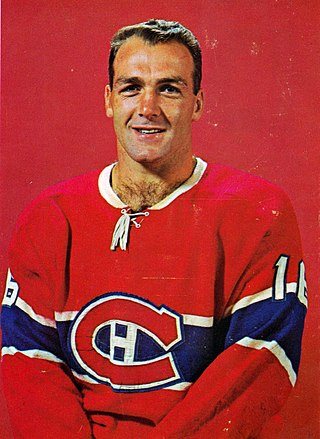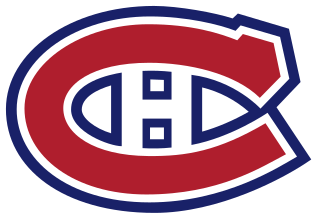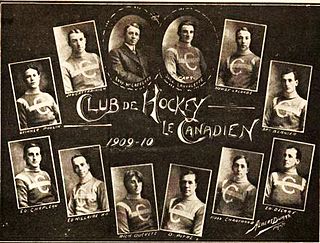
Yvan Serge Cournoyer is a Canadian former professional hockey right winger who played in the National Hockey League for the Montreal Canadiens for 16 seasons, from 1963–64 to 1978–79, winning 10 Stanley Cups. In 1972, Cournoyer scored the tying goal in the deciding game eight of the Canada-USSR series with seven minutes remaining. Canada went on to win the game and the series on Paul Henderson's dramatic goal with 34 seconds left in the game.
The 1959–60 NHL season was the 43rd season of the National Hockey League. The Montreal Canadiens were the Stanley Cup winners as they defeated the Toronto Maple Leafs four games to none for their fifth straight Stanley Cup.

Joseph Henri Richard was a Canadian professional ice hockey player who played centre with the Montreal Canadiens in the National Hockey League (NHL) from 1955 to 1975. He was nicknamed "Pocket Rocket" after his older brother, Canadiens' legend and fellow Hockey Hall of Famer Maurice "Rocket" Richard. Henri won the Stanley Cup 11 times as a player, the most in NHL history. Richard and Bill Russell of the National Basketball Association are tied for the record of the most championships won by an athlete in a North American sports league. In 2017, Richard was named one of the '100 Greatest NHL Players' in history.

Joseph Hector "Toe" Blake was a Canadian ice hockey player and coach in the National Hockey League (NHL). Blake played in the NHL from 1935 to 1948 with the Montreal Maroons and Montreal Canadiens. He led the NHL in scoring in 1939, while also winning the Hart Trophy for most valuable player, and served as captain of the Canadiens from 1940 to his retirement. He won the Stanley Cup three times as a player: in 1935 with the Maroons, and in 1944 and 1946 with the Canadiens. While with the Canadiens Blake played on a line with Elmer Lach and Maurice Richard which was dubbed the Punch line, as all three were highly-skilled players. In 2017 Blake was named one of the '100 Greatest NHL Players' in history. He was also known as "The Old Lamplighter" due to his skill for putting the puck in the net.

The Montreal Junior Canadiens were a junior ice hockey team in the Quebec Junior Hockey League from 1933 to 1961, and the Ontario Hockey Association from 1961 to 1972. They played out of the Montreal Forum in Montreal, Quebec, Canada.
The 1980–81 NHL season was the 64th season of the National Hockey League. The Flames relocated from Atlanta to Calgary. The New York Islanders were the top regular season team and the top playoff team, winning their second consecutive Stanley Cup by defeating the Minnesota North Stars in five games.
The 1979–80 NHL season was the 63rd season of the National Hockey League. This season saw the addition of four teams from the disbanded World Hockey Association as expansion franchises. The Edmonton Oilers, Winnipeg Jets, New England Whalers, and Quebec Nordiques joined the NHL, bringing the total to 21 teams. The other two WHA teams were paid to fold.
The 1961–62 NHL season was the 45th season of the National Hockey League (NHL). The Toronto Maple Leafs were the Stanley Cup champions as they defeated the Chicago Black Hawks four games to two.
The 1956–57 NHL season was the 40th season of the National Hockey League. Six teams each played 70 games. The Montreal Canadiens won the Stanley Cup for the second consecutive season, defeating the Boston Bruins four games to one in the best-of-seven final series. The final game was won with a clutch goal from Montreal defenceman Tom Johnson that clinched the Stanley Cup championship for the Canadiens 3–2.
The 1972–73 NHL season was the 56th season of the National Hockey League. Sixteen teams each played 78 games. Two new teams, the New York Islanders and the Atlanta Flames, made their debuts. The Montreal Canadiens won the Stanley Cup by beating the Chicago Black Hawks four games to two in the Stanley Cup Finals.
The 1969–70 NHL season was the 53rd season of the National Hockey League. For the third straight season, the St. Louis Blues reached the Stanley Cup Finals, and for the third straight year, the winners of the expansion West Division were swept four games to none. This time, however, it was at the hands of the Boston Bruins, as the defending champions Montreal Canadiens narrowly missed the playoffs, something that did not happen again for the next quarter century. With both the Canadiens and Toronto Maple Leafs missing the 1970 Stanley Cup playoffs, it was the first time in league history that no Canadian team in the NHL qualified for the playoffs. It was also the final season that teams wore their colored jerseys at home until the 2003–04 season.
The 1970–71 NHL season was the 54th season of the National Hockey League. Two new teams, the Buffalo Sabres and Vancouver Canucks made their debuts and were both put into the East Division. The Chicago Black Hawks were moved to the West Division, and the Oakland Seals were renamed the California Golden Seals. The Montreal Canadiens won the Stanley Cup by beating the Black Hawks in seven games in the finals.
The 1973–74 NHL season was the 57th season of the National Hockey League. The Philadelphia Flyers won the Stanley Cup championship, the team's first. The team was the first of the post-1967 teams to win the Cup.
The 1977 Stanley Cup Finals was the championship series of the National Hockey League's (NHL) 1976–77 season, and the culmination of the 1977 Stanley Cup playoffs. It was contested between the Boston Bruins and the defending champion Montreal Canadiens. The Bruins were making their first appearance in the final series since their loss in the 1974 Final. The Canadiens would win the best-of-seven series four games to none, to win their second straight Stanley Cup championship, and 20th overall.
The 1978 Stanley Cup Finals was the championship series of the National Hockey League's (NHL) 1977–78 season, and the culmination of the 1978 Stanley Cup playoffs. It was contested between the Boston Bruins and the defending champion Montreal Canadiens, making their third straight appearance in the Finals. The series was a rematch of the 1977 Stanley Cup Finals. The Canadiens won the best-of-seven series, four games to two, to win their third consecutive Stanley Cup championship and their 21st overall. This was the last time that both the Boston Bruins and Montreal Canadiens met in the Stanley Cup Finals. The Canadiens eventually joined the Bruins in the Adams Division in 1982.
The 1979 Stanley Cup Finals was the championship series of the National Hockey League's (NHL) 1978–79 season, and the culmination of the 1979 Stanley Cup playoffs. The New York Rangers challenged the defending champion Montreal Canadiens, who made their fourth straight appearance. It was New York's first foray into the Finals since 1972. The Canadiens would win the best-of-seven series, four games to one, to win their fourth consecutive Stanley Cup championship.
The 1973 Stanley Cup Finals was the championship series of the National Hockey League's (NHL) 1972–73 season, and the culmination of the 1973 Stanley Cup playoffs. It was contested between the Chicago Black Hawks and the Montreal Canadiens, a rematch of the 1971 Final. The Canadiens won the best-of-seven series, four games to two to win their 18th Stanley Cup championship.
The 1971 Stanley Cup Finals was the championship series of the National Hockey League's (NHL) 1970–71 season, and the culmination of the 1971 Stanley Cup playoffs. It was contested between the Chicago Black Hawks and the Montreal Canadiens. The Black Hawks made their first appearance in the finals since 1965, while the Canadiens had last played in and won the final in 1969. The Canadiens won the series, four games to three.

The Montreal Canadiens ice hockey club, formally Le Club de Hockey Canadien, was founded on December 4, 1909. The Canadiens are the oldest professional hockey franchise in the world. Created as a founding member of the National Hockey Association (NHA) with the aim of appealing to Montreal's francophone population, the Canadiens played their first game on January 5, 1910, and captured their first Stanley Cup in 1916. The team left the NHA and helped found the National Hockey League (NHL) in 1917. They returned to the Stanley Cup Finals in 1919, but their series against the Seattle Metropolitans was cancelled without a winner due to the Spanish flu pandemic that killed defenceman Joe Hall. The Canadiens have won the Stanley Cup 24 times: once while part of the National Hockey Association (NHA), and 23 times as members of the NHL. With 24 NHL titles overall, they are the most successful team in league history.

The Bruins–Canadiens rivalry is a National Hockey League (NHL) rivalry between the Boston Bruins and Montreal Canadiens. It is considered "one of the greatest rivalries in sports." Retired Bruins forward Bob Sweeney, who played for the Bruins between 1986–87 and 1991–92, once called it among the "top three rivalries in all of sports,... right up there with the... New York Yankees–Boston Red Sox." The two teams have played each other more times, in both regular season play and the Stanley Cup playoffs combined, than any other two teams in NHL history.






